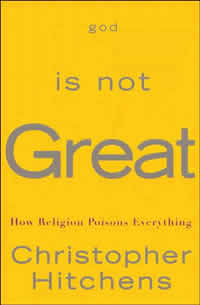Book Notes
 Christopher Hitchens, God Is Not Great; How Religion Poisons Everything (New York: Twelve, 2007), 307pp.
Christopher Hitchens, God Is Not Great; How Religion Poisons Everything (New York: Twelve, 2007), 307pp.
I've always enjoyed watching the iconoclastic Christopher Hitchens on television, and even went to a local bookstore to hear him speak after I finished his book. Few public intellectuals can match his colorful polemic, his encyclopedic intellect, and his rapier wit. He's a great story teller with good stories to tell. I highly recommend that religious believers of all sorts read God Is Not Great, mainly to consider just how malevolent and irrational religious sincerity can be. It's bitter medicine, but I was glad I took it.
While this book sizzles from start to finish, you won't find much steak in it. Hitchens falls far short of accomplishing his lofty goal to show how "all the claims of established religion are bogus, and man-made, and undeserving of anything but contempt and ridicule." Hitchens chronicles page after page of religious atrocities to show that religion is a man-made wish fulfillment, only later to admit that just as virtuous behavior by believers is "no proof at all" of their religion, neither does evil behavior discredit religion (185). It's really "undecidable" whether we ought to take good or bad deeds as paradigmatic of religion (188). In fact, whether religion has done harm or good, he says, "does not say anything at all about its truth or authenticity" (217, his emphasis). Finally, I find it odd that his greatest heroes were all. . . theists (Franklin, Jefferson, Paine, etc.).
Hitchens especially laments the bigotry and intolerance of religious believers. He sings the praises of Spinoza's "calm and rational conversation" and Lessing's "becoming modesty." He quotes EP Thompson's memorable caution about "the enormous condescension of posterity." He claims that along with his fellow atheists he does not "hold our convictions dogmatically." In practice, though, and this is one factor that makes his book so entertaining, Hitchens derides religious people as "yokels, idiots, boobies, and ignoramuses." Religious arguments are so much "piffle," "pointless, laughable, and pathetic." His own arguments, on the other hand, he believes are "irrefutable, insuperable, inescapable, devastating, unanswerable." Finally, with a sort of shrug of his shoulders, he admits that he himself is no moral exemplar and that along with all humanity he too has an "overwhelming tendency to stupidity and selfishness." Hitchens is thus a patronizing parody of the certitude and exaggerated claims that he attacks.
In print and in public Hitchens loves to appeal to Einstein, but Einstein strongly objected to what he called "fanatical atheists" who tried to conscript his reputation for their cause. Many people will object to how thoroughly he reduces social problems to religion alone. Few serious thinkers will follow Hitchens' contention that the existence of Jesus is "highly questionable" because it has "little or no evidence." He assumes rather than argues that a world without religion would, on par, be better than a world with religion, and at one point seems to suggest that history has no meaning and that the cosmos is but a "junkyard." The Harvard Islamic scholar Wilfred Cantwell Smith once observed that almost all intelligent peoples and cultures throughout history have always been religious. It's unfortunate that as one of our leading public intellectuals Christopher Hitchens cannot move beyond his considerable gifts of sarcasm and ridicule to shed some new light on that empirical truth.


